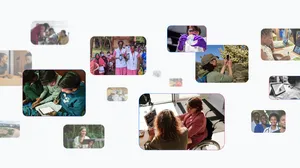Help for Asia’s change-making nonprofit leaders

As someone who came to Google from the nonprofit world, I understand how challenging it can be for nonprofit organizations to find the right resources and talent to tackle some of the world's complex challenges.
COVID-19 doesn't make it easier. So in June this year, Google.org granted $600,000 to Ashoka: Innovators for the Public, helping them launch a six-month capacity-building program for 28 nonprofits from Singapore, Indonesia and India, in partnership with Infoxchange and Sattva Consulting. The Changemaker Journey program has two main goals. First, to help nonprofits get the tools, knowledge and skills to meet their immediate priorities and sustain their efforts over the long-term. Second, to build a community where organizations can learn from one another, collaborate, and discover new ideas together.
I spoke to Janine Teo, founder and CEO of Solve Education, a Singapore-based nonprofit working to make high-quality education more accessible, to learn about her personal journey and how the program has helped her during the pandemic.

Tell me about yourself. What led you to the nonprofit world?
It started with two questions from my mentor. He first asked, "What are you working so hard for?" My parents grew up in poverty. Both of them had to drop out of school to support the family, but they knew the importance of education. My father put himself back to school and graduated when he was 30. My mother paid off her brothers' education fees then enrolled herself in night school to get her diploma. My parents showed me how you could still learn and grow even at a later age.
He then asked, "What's your purpose?" I was trained as a software engineer but tried different industries, including hospitality. While I appreciated these experiences, I knew I wanted to solve deeper problems, contribute to society and help others. So five years ago, and with my mentor’s support, I’d started Solve Education to help people of all ages, nationalities, and backgrounds get a high-quality education.
Has it been challenging being a social entrepreneur in 2020?
Definitely—we can all agree education creates opportunities. But COVID-19 has made learning challenging, especially for those in underserved communities. Some of the families we support in India don't have the luxury to socially distance themselves — or even study — because of the lack of space. For others, being a daily wage worker means they need to find work every day to put food on the table. The people we serve are more afraid of dying of hunger than the pandemic—it’s survival mode for many of them. We had to be creative to solve this problem, so we introduced Game for Charity, a point-based program where beneficiaries could earn points by completing learning modules and exchange these points for food packages.
What inspired you to be part of the capacity-building program, and how did it help your organization?
The concept of finding solutions to complex problems that have positive effects in changing the system fascinates me. As a social entrepreneur, I think it's important to look at the root causes of the problems we’re looking to solve. I also wanted to widen my network through the Ashoka Foundation and Google.org—and continue learning, too. In fact, one of my most memorable sessions from the program was attending a Google Ads coaching session led by Google volunteers with my team. The session was so useful because it was exactly what we needed help with!
This program also gave us a fresh perspective one some of the issues we’re dealing with. It helped us question ourselves more and home in on projects that will have the biggest impact.
The truth is, capacity-building is often overlooked. It's hard to expect nonprofits to contribute to systemic change without building their ability to think critically, as well as the broader skills they need to run their organization effectively. After all, we are solving problems that no one has solved before. When we look at education, we still have a world where 263 million children and youth aren’t attending school. We are nowhere near solving the problem, but joining this program gave me and my team the inspiration and excitement to continue challenging ourselves.






